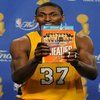I'm baffled why Baylor isn't getting more traction. He was #21 in 2008, #26 in 2011, and #33 in 2014, and he fell 12 places, not because 12 new players came in above him, but apparently because the general consensus about him soured.
In my view, one of the biggest issues holding him back is lack of familiarity among the voting pool. If you can, take some time to review this video. It's long (over 50 minutes), so I don't expect everyone to watch the whole thing, but even a few minutes will give you a sense of the type of player Baylor was.
I'm not generally a fan of YouTube highlights, but these are instructive for several reasons:
-- There's so little video of Baylor available that this at least provides something.
-- Rather than the typical ooh and aah video, this one breaks down his abilities into categories.
-- B-R.com stats are valuable, but they don't show a level of greatness that becomes apparent when watching a player like Baylor.
The video is particularly good at emphasizing several aspects of Baylor's game.
-- Offensively, he can score from inside, mid-range, and outside, and can use either hand inside. He has excellent ballhandling skills, body control, and strength. He is able to challenge big men like Russell by using his quickness and speed to gain an edge to the basket or by jumping laterally and not releasing his shot until he's on the way down. He combines all those skills with an innate creativity that makes him an exceptional scorer.
-- His rebounding is GOAT for his position. The video shows him getting rebounds when it looks like other players had a better chance at them.
-- His passing is outstanding. His defense was very good.
-- He combined his rebounding, speed when dribbling the ball, and passing to initiate the fast break, much like Magic Johnson and Draymond Green.
Consider some basic facts about Baylor.
RS career averages of 27.4 points (3rd all time), 13.5 rebounds (10th), 4.3 assists
PS career averages of 27.0 points (7th), 12.9 rebounds (13th), 4.0 assists
RS career totals of 23,149 points (34th), 11,463 rebounds (27th, 1st among SFs), 3650 assists in 846 games
Had two postseasons when he averaged over 38 PPG (4th and 5th)
Holds the finals records for points in a game -- 61
10th all time in career finals PPG -- 26.4
17 50-point RS games (4th)
Played in 44 finals games (11th)
Averaged 19.8 rebounds in 1960-61 -- only five players have done better (Wilt, Russell, Thurmond, Pettit, Lucas)
Going to stop here to post this so that I get my vote in. Will address criticisms of Baylor when I can.
Vote: Baylor
Alternate: HavlicekIf you're not outraged, you're not paying attention.






































